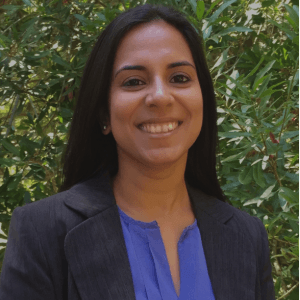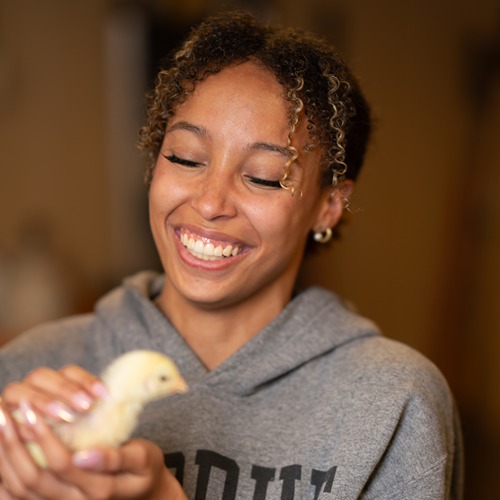Ag econ professor explores economic impact of gendered labor roles in developing countries

Kajal Gulati, assistant professor of agricultural economics and the department’s newest faculty member, is not accustomed to being grounded for so long. Starting at Purdue during this fall under a hybrid teaching model, extensive university and international travel restrictions and a bevy of other regulations was not how she envisioned her first semester.
“But I’m making it work,” Gulati said. “We’re all finding creative ways to make it work and doing our best.”
Normally, Gulati’s research takes her around the world, primarily to developing countries, where she studies the intersection of gendered labor markets, household decision-making and technology adoption in agrarian communities. To date, Gulati has conducted research in India, Mali and Uganda.
In many countries, higher labor force participation by women has narrowed the gender gap in employment. This trend, however, is not true in rapidly-growing countries like India. Despite substantial increases in women's educational attainment, fertility transition, and economic growth, Indian women's labor market participation has dropped.
"In India, agricultural technologies are being rapidly adopted and these technologies impact men’s and women’s labor markets differently."
“In addition to underutilizing the labor resources of an economy, women’s low labor force participation rates have broader, deeper social implications: market work increases women's access to economic opportunities and decision-making power within the family. I examine the causes and consequences of women's labor force participation and labor displacement, both within the family and in the overall labor market,” Gulati said.
In India, agricultural technologies are being rapidly adopted and these technologies impact men’s and women’s labor markets differently. One example Gulati’s research examines is the adoption of mechanical rice transplanting, a practice that automates a labor-intensive task usually delegated to women. Her findings indicate that, even if women’s activities on the farm are associated with significant drudgery and they want to adopt labor-saving farm technologies, the decision to actually adopt rests with the men.
This has numerous implications, Gulati argued, such as keeping women in traditional gendered roles with less economic bargaining potential and limiting household incomes. Gaining insight into how, why, and who makes the decisions within the household is vital to better understanding the implications for not only women’s and men’s labor markets but also women’s economic empowerment.
“What this work is showing is that efforts to enhance adoption of gender-specific, welfare-enhancing products and services may not be successful without broader efforts to improve women’s bargaining potential.”
Although Gulati’s research relies on understanding domestic and civic dynamics, her methods are wholly quantitative. Using her experience in the field and methodological training, Gulati devised multiple rounds of surveys and field experiments for her studies in India. Although a quantitative approach may prove tidier than a mixed-methods or qualitative study, Gulati said it is not without challenges.
“The survey methods I used are experimental,” Gulati said. “The main challenges are overcoming barriers in education and comprehension, especially among women who have limited social mobility and interactions. To do this, I conduct cognitive testing before running the actual experiment, testing the survey on participants to make sure the questions are understood and straightforward. I run many, many rounds of pre-testing to refine the research protocols.”
Gulati recently surveyed 1,000 households in the Indian state of Bihar, which is one of the poorest states in India. The experiment also required delivering heavy agricultural machinery services to rural areas where the technology had never been used before.
Gulati’s work in Uganda focused on formative research for a livelihood intervention implemented among ultra-poor refugee and Ugandan households. Her more nascent project in Mali works with children in the classroom environment to evaluate a Food for Education program in regions of high conflict and political instability funded by the United States Department of Agriculture. The program has encountered speedbumps – several schools shut down during the course of the program’s implementation due to political insecurity – but Gulati said early findings show training teachers, even under such circumstances, improves the education outcomes of primary school-aged children.
Gulati’s work takes deep dives into areas of the world that are difficult to reach and even more difficult to research. Such work requires building trust and reliability, and is essential for understanding how these rapidly changing societies and economies can best be served by advancements, policies and programs.
“There is a lot that is changing—and it’s changing very quickly,” Gulati said. “When studying poverty in my undergraduate course on international economic development, I told my students recently that it is unfair that inequities based on where you are born and what your gender is drives your outcomes in life,” Gulati said.
These inequities have consequences for economic efficiency and welfare. Gulati’s work aims to show how these inequities are tied to welfare losses and what could work in reducing these deeply-entrenched inequities in society. Using data and economic tools to tell stories about those who lack a voice is Gulati’s primary research motivation and her way of connecting with them.







